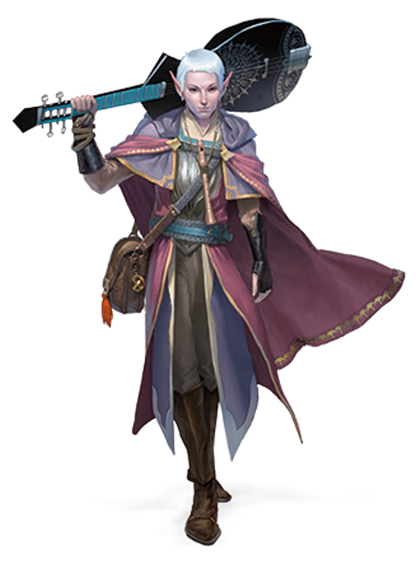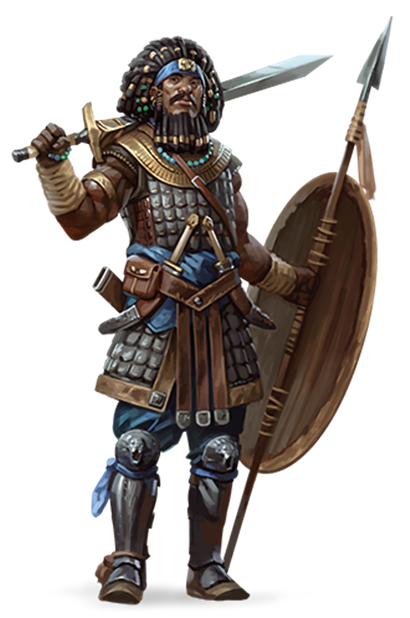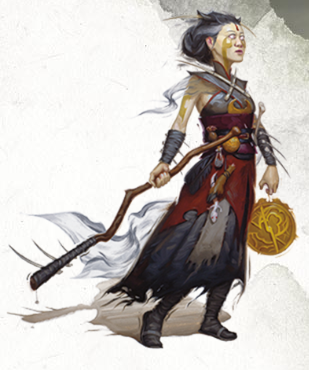The Enchanting Bard 5e: A Guide to the 5e D&D Class
Contents
The Bard is a versatile and charismatic spellcaster in the world of Dungeons and Dragons 5e. With their keyword “Bard 5e,” they embody the essence of music, performance, and enchantment. Bards are masters of both arcane and divine magic, using their captivating performances and melodious talents to weave spells and inspire their allies.
As a Bard, your charisma and creativity fuel your abilities. Whether you strum the strings of a lute, sing an ancient ballad, or recite a powerful poem, your words, and music hold the power to sway minds, mend wounds, and even unleash destructive forces upon your foes.
One of the defining features of the Bard class is their unique Bardic Inspiration ability. By infusing their words and music with magical essence, Bards can inspire their comrades, granting them additional abilities and boosting their chances of success in combat or skill checks.
Additionally, Bards can choose a Bardic College, further specializing their talents. The College of Lore allows Bards to become masters of knowledge, with access to a vast array of spells and expertise in various skills. On the other hand, the College of Valor transforms Bards into formidable warriors, blending martial prowess with magical abilities.
Bards are not limited to spellcasting alone; they also possess a wide range of versatile skills. They can excel in social interactions, charming and deceiving others with their persuasive words and captivating performances. Bards can also pick up a variety of proficiencies, from musical instruments to acrobatics, making them adept in many different situations.
The bard is a standard playable character class in numerous versions of the Dungeons & Dragons serpents dream pretending game. The bard class is flexible, equipped for battle and enchantment (divine enchantment in prior releases, arcane enchantment in later versions).
Bards utilize their aesthetic abilities to incite otherworldly effects. The class is approximately founded on the extraordinary enchantment that music holds in stories, for example, the Pied Flautist of Hamelin, and in prior renditions was substantially more similar to being a Celtic Fili or a Norse Skald, even though these components have to a great extent been expelled in later releases. Recorded motivations for bards incorporate Taliesin, Homer, Will Red, and Alan-a-Dale.
Unleashing the Power of the Bard 5e

The Bard is fabulously flexible. With access to each aptitude, skill, full throwing, and a not-too-bad arrangement of proficiencies, the Bard can fill every job in the gathering. The Legend Bard is a greater amount of the exemplary steady Bard, with improved enchanted alternatives and bolster capacities, while the Valor Bard is a better-than-average bleeding-edge skirmish character who can bring their spellcasting and bolster abilities into the warmth of fight.
Check also: Rogue 5e
Bards can be a piece disappointing as far as battle harm at early Level 1 play (first fourth Level), however, they can be outright mammoths at utility and backing. Utilizing Horrendous Joke as the primary harm source sounds clever from the outset, yet then everyone understands that this cantrip ordinarily directs the bearing of battle as much as flatulating in the general course of the foe. The inconvenience of assaults is decent, however.
| Level | Proficiency | Features | Cantrips | Spells | —Spell Slots per Spell Level— | ||||||||
|---|---|---|---|---|---|---|---|---|---|---|---|---|---|
| Bonus | Known | Known | 1st | 2nd | 3rd | 4th | 5th | 6th | 7th | 8th | 9th | ||
| 1st | 2 | Spellcasting, Bardic Inspiration (d6) | 2 | 4 | 2 | — | — | — | — | — | — | — | — |
| 2nd | 2 | Jack of All Trades, Song of Rest (d6) | 2 | 5 | 3 | — | — | — | — | — | — | — | — |
| 3rd | 2 | Bard College, Expertise | 2 | 6 | 4 | 2 | — | — | — | — | — | — | — |
| 4th | 2 | Ability Score Improvement | 3 | 7 | 4 | 3 | — | — | — | — | — | — | — |
| 5th | 3 | Bardic Inspiration (d8), Font of Inspiration | 3 | 8 | 4 | 3 | 2 | — | — | — | — | — | — |
| 6th | 3 | Countercharm, Bard College Feature | 3 | 9 | 4 | 3 | 3 | — | — | — | — | — | — |
| 7th | 3 | — | 3 | 10 | 4 | 3 | 3 | 1 | — | — | — | — | — |
| 8th | 3 | Ability Score Improvement | 3 | 11 | 4 | 3 | 3 | 2 | — | — | — | — | — |
| 9th | 4 | Song of Rest (d8) | 3 | 12 | 4 | 3 | 3 | 3 | 1 | — | — | — | — |
| 10th | 4 | Bardic Inspiration (d10), Expertise, Magical Secrets | 4 | 14 | 4 | 3 | 3 | 3 | 2 | — | — | — | — |
| 11th | 4 | — | 4 | 15 | 4 | 3 | 3 | 3 | 2 | 1 | — | — | — |
| 12th | 4 | Ability Score Improvement | 4 | 15 | 4 | 3 | 3 | 3 | 2 | 1 | — | — | — |
| 13th | 5 | Song of Rest (d10) | 4 | 16 | 4 | 3 | 3 | 3 | 2 | 1 | 1 | — | — |
| 14th | 5 | Magical Secrets, Bard College Feature | 4 | 18 | 4 | 3 | 3 | 3 | 2 | 1 | 1 | — | — |
| 15th | 5 | Bardic Inspiration (d12) | 4 | 19 | 4 | 3 | 3 | 3 | 2 | 1 | 1 | 1 | — |
| 16th | 5 | Ability Score Improvement | 4 | 19 | 4 | 3 | 3 | 3 | 2 | 1 | 1 | 1 | — |
| 17th | 6 | Song of Rest (d12) | 4 | 20 | 4 | 3 | 3 | 3 | 2 | 1 | 1 | 1 | 1 |
| 18th | 6 | Magical Secrets | 4 | 22 | 4 | 3 | 3 | 3 | 3 | 1 | 1 | 1 | 1 |
| 19th | 6 | Ability Score Improvement | 4 | 22 | 4 | 3 | 3 | 3 | 3 | 2 | 1 | 1 | 1 |
| 20th | 6 | Superior Inspiration | 4 | 22 | 4 | 3 | 3 | 3 | 3 | 2 | 2 | 1 | 1 |
Bards are an ideal fit for a gathering that adores buffs and debuffs. Utilize aptitude capability and spells for social cooperation and investigation.
One spell can be swapped out for another for each level picked up. This proves to be useful when the Bard needs to refresh their armory for the mid-late game.
Class Features
Cells and Mythical serpents have been around for a strong four decades. Because of that, the renowned pretending game has experienced a few emphases. The most recent fifth release offers a flock of fascinating classes for each player to browse. Given that, we have created a point-by-point assemble management for one of D&D’s top-level classes.
Hit Points
- Hit Dice: 1d8 per bard level
- Hit Points at 1st Level: 8 + your Constitution modifier
- Hit Points at Higher Levels: 1d8 (or 5) + your Constitution modifier per bard level after 1st
Proficiencies
- Armor: Light armor
- Weapons: Simple weapons, hand crossbows, longswords, rapiers, shortswords
- Tools: Three musical instruments of your choice
- Saving Throws: Dexterity, Charisma
- Skills: Choose any three
Equipment
You start with the following equipment, in addition to the equipment granted by your background:
- (a) a rapier, (b) a longsword, or (c) any simple weapon
- (a) a diplomat’s pack or (b) an entertainer’s pack
- (a) a lute or (b) any other musical instrument
- Leather armor and a dagger
The bard is maybe probably the most grounded class inside Prisons and Mythical serpents. Profoundly versatile, the bard is equipped for accepting practically any job as the need emerges. Subsequently, you can’t generally ever turn out badly by having one of these characters in your group.
Check also: The Wizard 5e class
As the bard’s quality pulls from the character’s amazing adaptability, this construct will be to some degree more muddled than others. The final product, nonetheless, is a character that is equipped for failing, managing single objective harm, managing AoE harm, mending, buffing partners, swarm control, and utility outside of battle. Indeed, it’s an extensive request. In any case, the bard is only that acceptable.
Spell Casting Ability
Dungeons & Dragons’ serpents are unpredictable. A few players attempt to dodge battle, as they incline toward the pretending parts of the game. In the meantime, different players like to utilize their bones to strike prisoners and battle beasts. Our guide is arranged towards amplifying a class’s battle viability, making this article likely progressively valuable to players of the last classification.
- Spell save DC = 8 + your proficiency bonus + your Charisma modifier
- Spell attack modifier = your proficiency bonus + your Charisma modifier
- Ritual Casting: You can cast any bard spell you know as a ritual if that spell has the ritual tag.
- Spellcasting Focus: You can use a musical instrument (see the Tools section) as a spellcasting focus for your bard spells.
Attributes
- Hit Die: d8
- Spellcasting Ability: Charisma
- Starting Gold: 5d4 x 10
- Subclass Name: Bard College
- Suggested Abilities: Charisma, Dexterity
Why Play a Bard?
There are several compelling reasons to play a Bard in D&D 5e. Here are a few:
- Versatility: Bards are one of the most versatile classes in the game. They can excel in multiple areas, including spellcasting, combat, and social interactions. Bards have access to a wide range of spells, allowing them to adapt to various situations and fill different roles within a party.
- Spellcasting and Support: Bards are charismatic spellcasters who can wield powerful magic. They have access to both arcane and divine spells, making them highly adaptable spellcasters. Bards can heal allies, buff their party members, manipulate the battlefield, and deal damage with their spellcasting abilities. They also have access to Bardic Inspiration, which provides valuable bonuses to their allies, enhancing their chances of success in critical moments.
- Skill Mastery: Bards are skilled individuals with expertise in various areas. They have a high number of skill proficiencies, making them excellent at social interactions, knowledge checks, and other utility skills. Bards can be the face of the party, charming NPCs, gathering information, and negotiating deals. Their versatility in skills allows them to contribute significantly to exploration and role-playing encounters.
- Captivating Performances: Bards are known for their captivating performances and the ability to inspire others through music, storytelling, oratory skills, or other artistic expressions. This adds a unique flavor to the role-playing aspect of the game. Bards can entertain crowds, sway opinions, and create memorable moments through their performances.
- Role-Playing Potential: Bards offer excellent opportunities for rich and engaging role-playing experiences. Their bardic abilities and musical talents provide a foundation for developing a unique and interesting character. Bards can have diverse backgrounds, from wandering minstrels to scholarly lore keepers or even rebellious poets. The Bard class invites creativity and encourages players to infuse their characters with personality, charisma, and artistic flair.
- Fun and Flavorful Mechanics: Bards have a variety of fun mechanics that make them enjoyable to play. From the unpredictable nature of their spells to the strategic use of Bardic Inspiration, Bards provide an interactive and engaging gameplay experience. Their class features, such as Jack of All Trades and Magical Secrets, offer interesting choices and opportunities for customization, making each Bard feel distinct.
In summary, playing a Bard in D&D 5e offers versatility, spellcasting prowess, support capabilities, skill mastery, captivating performances, and rich role-playing potential. Bards bring a unique blend of utility, creativity, and charm to the table, making them a rewarding and enjoyable class choice for many players.
Bards Are Great for Beginners
Bards offer beginners a versatile, adaptable, and engaging class option in D&D. Their flexibility, skill proficiencies, support abilities, and engaging role-playing opportunities make them a great choice for players who are new to the game and want to explore different aspects of the game mechanics and storytelling.
The Bard’s Defining Features
- Spellcasting: Bards are proficient spellcasters and rely on their magical abilities to shape the course of events. They use their charisma as their spellcasting ability, allowing them to manipulate the weave of magic through their sheer force of personality. Bards have access to a diverse spell list that includes both arcane and divine spells, granting them versatility in their magical repertoire.
- Bardic Inspiration: Bardic Inspiration is a core feature of the Bard class. Bards can use a bonus action to inspire their allies with words, music, or other forms of artistic expression. This inspiration grants a Bardic Inspiration die, which allies can use to add to their ability checks, attack rolls, or saving throws, providing a boost at critical moments. The Bardic Inspiration die’s size increases as the Bard gains levels, making it more potent.
- Jack of All Trades: Bards have a feature called “Jack of All Trades,” which reflects their diverse skill set. This feature grants the Bard a bonus to all ability checks in which they are not already proficient. It highlights Bard’s adaptability and versatility, allowing them to be competent in various areas even if they haven’t specialized in specific skills.
- Expertise: Bards gain the Expertise feature, which allows them to double their proficiency bonus for two skills of their choice. This feature emphasizes the Bard’s skill mastery and allows them to excel in specific areas. It provides a chance to shine in social interactions, knowledge checks, or any other skills that the Bard chooses to focus on.
- Bardic College: Bards can choose a Bardic College at the 3rd level, which further defines their abilities and playstyle. The College of Lore emphasizes knowledge and versatility, granting additional spells, skills, and the Cutting Words feature that can hinder opponents. The College of Valor, on the other hand, emphasizes combat prowess, granting additional weapon and armor proficiencies, as well as features that enhance Bard’s combat capabilities.
- Magical Secrets: At the 10th level, Bards gain access to the Magical Secrets feature, which allows them to learn spells from any class’s spell list. This feature showcases Bard’s knack for uncovering hidden knowledge and unique magical abilities. It provides an opportunity for Bards to learn spells that suit their playstyle or to access powerful spells from other classes.
- Capstone: At the 20th level, Bards receive their Capstone feature, which varies depending on their chosen Bardic College. These capstone features represent the culmination of Bard’s journey and often provide extraordinary and potent abilities that reflect their unique path.
In summary, the Bard class is characterized by its spellcasting prowess, Bardic Inspiration, versatility in skills, Bardic College specialization, Expertise, and the ability to learn spells from other classes. These defining features combine to create a dynamic and flexible class that excels in both magic and support, making Bards a memorable and captivating addition to any adventuring party.
Conclusion
In conclusion, the Bard class in D&D 5e, with its keyword “Bard 5e,” is a captivating and magical force to be reckoned with. With their melodic abilities, versatile spellcasting, and captivating performances, Bards bring a unique flair to any adventuring party, enchanting both allies and enemies alike.
FAQs
Q: What abilities do Bards have in D&D 5e?
A: Bards in D&D 5e have a wide range of abilities. They are proficient spellcasters, using their charisma to cast spells from the Bard spell list. Bards also have access to Bardic Inspiration, which allows them to inspire allies and grant them additional bonuses. They can choose a Bardic College, such as the College of Lore or the College of Valor, which grants them additional features and abilities. Bards are also skilled in a variety of skills and can choose expertise in specific areas, making them versatile in social interactions, exploration, and combat.
Q: What is Bardic Inspiration and how does it work?
A: Bardic Inspiration is a core ability of the Bard class. Bards can use a bonus action to expend one of their uses of Bardic Inspiration and choose an ally within 60 feet who can hear them. The ally gains a Bardic Inspiration die, which they can add to their ability check, attack roll, or saving throw before they know the result. The Bardic Inspiration dies size increases as the Bard gains levels. The inspiration die can be used only once and expires after 10 minutes if not used.
Q: Can Bards wear armor and use weapons?
A: Yes, Bards have proficiency with light armor, simple weapons, and a selection of other weapons depending on their chosen Bardic College. They can wear light armor without any penalties to their spellcasting abilities.
Q: Can Bards heal and support their allies?
A: Yes, Bards have access to healing spells on their spell list, such as Cure Wounds and Healing Word, allowing them to heal and support their allies during combat. Bards can also use their Bardic Inspiration to grant temporary bonuses to their allies, enhancing their chances of success in various situations.
Q: Can Bards be effective in combat?
A: Absolutely! Bards may not have the same martial prowess as fighters or barbarians, but they can hold their own in combat. Bards have access to spells that deal damage or hinder enemies, and they can use weapons proficiently. Additionally, some Bardic Colleges, such as the College of Valor, provide additional combat-focused features, making Bard’s versatile combatants.
Q: Can Bards multiclass with other classes?
A: Yes, Bards can multiclass with other classes. Since Bards are spellcasters, it’s important to consider the spellcasting rules when multiclassing. Bards use Charisma as their spellcasting ability, so if multiclassing into another spellcasting class, the character needs to have a high Charisma score to effectively cast spells from both classes.
Q: What role does a Bard typically play in a party?
A: Bards can fulfill various roles in a party. They can be excellent support characters, providing healing, buffs, and inspiration to their allies. Bards can also be skill monkeys, excelling in a wide range of skills and social interactions. Depending on their chosen Bardic College, they can also serve as capable spellcasters or even frontline combatants. The versatility of the Bard class allows players to adapt their playstyle to fit the needs of the party.
Q: How many spell slots does a bard have?
A: A first-level bard can study two cantrips from the bard spell listing – cantrips don’t fee a spell slot to forged – as nicely as 4-degree one-bard spells. Bards have got entry to two spell slots to commence with, with the potential that they can solid most of two spells between lengthy rests.
Q: What spells does a bard get?
A: Whichever spells you determine to take sincerely rely upon what sort of bard you desire to craft. There are a lot of definitely beneficial spells – such as Mage Hand, Message, and Disguise Self – combined with a few offensive options, such as Thunderwave and Vicious Mockery.
Q: What’s the pleasant race for a bard in DnD 5E?
A: Of course, any race is a plausible desire when making a Dungeons & Dragons personality and gamers shouldn’t ever be confined to making the ‘efficient’ choice. Ultimately, selecting something you feel like taking part in has to be the deciding factor.
Q: Is Bard or Warlock nearer to the Rolemaster’s Mentalist?
A: We are now not acquainted with Rolemaster, however, primarily based on what you have given us, we can say that a Warlock with the Otherworldly Patron of The Great Old One is what you are searching for.


